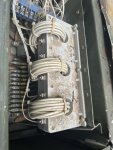Bassfishin114
Member
- 19
- 33
- 13
- Location
- Orlando Florida
I am fairly new to the military genset world but have spent countless hours on this site reading and have found so much valuable information. I have my Mep802a hooked up to my house as a back up generator. Today I did the first load test and it was going good. I turned the oven on and it was pulling around 20amps and showing about 60-70% load ( no other circuit connected). After a minute it tripped the overload. I retried this multiple times and got the same result. Have L1,L3 wired to hot, N to panel ground, and it is unbonded at the generator. I do not have a grounding rod or ground connected. Should that be done and would that cause this issue? When it tripped there was no amp increase or load increase indicated. I let it run for about an hour at 40% load with no issues. Unit is running about 62hz/245v without load and 61hz/242v under 60% load. Can anyone lead me in the right direction? I skimmed through the TS section of the manual but didn’t see anything really related.
Last edited:




